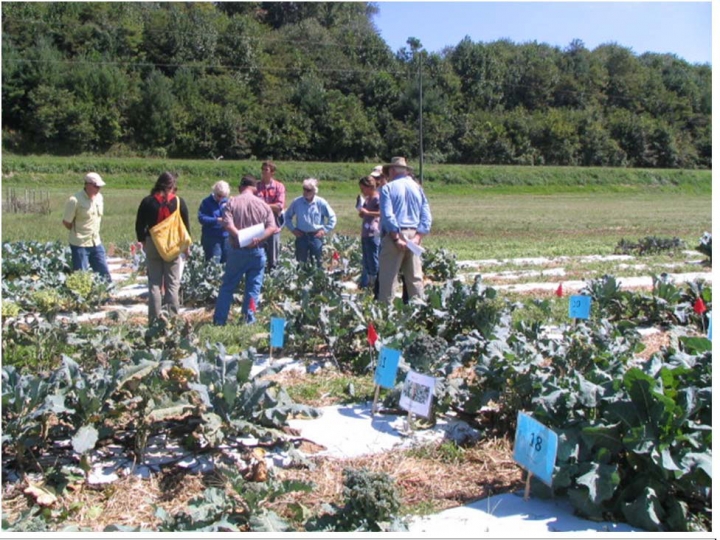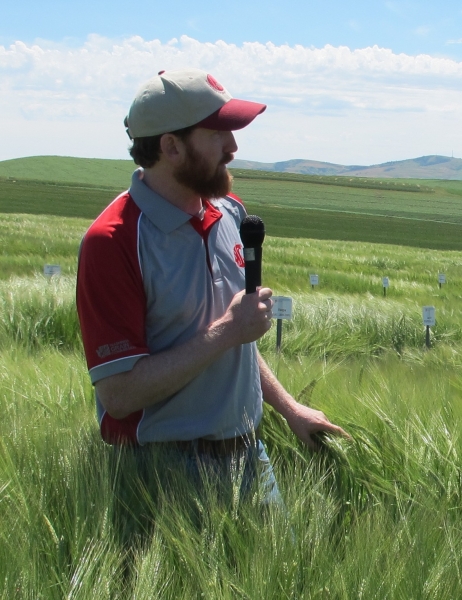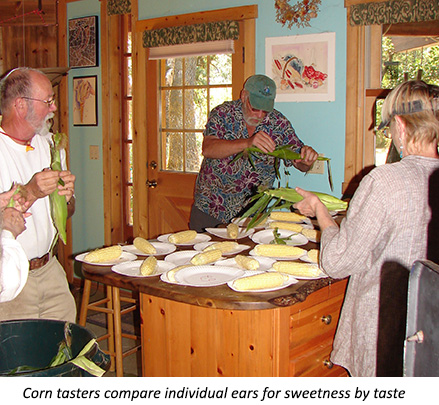Breeding
Developing open-pollinated corn varieties for organic farmers
The purpose of this project has been to develop and evaluate our open-pollinated corn varieties for organic farmers. Our major efforts have been to increase the qualitative value and future marketability of these populations and also to increase their genetic diversity and agronomic value. This year we continued to breed white, yellow, red, and blue field corn varieties towards fitting niche markets that would give farmers that used this corn economic benefits.
Targeted mowing as a weed management method increasing allelopathy in rye (Secaule cereale L.)
Winter rye (Secale cereale L.) is an outstanding cover crop in its suppression of early season weeds. This suppression has been largely attributed to allelopathy; ryeís allelochemicals inhibit weed germination and growth. However, its lack of suppression of late season weeds and its inconsistent results between years and regions hinder the use of rye as a cover crop. This study, which is Part I of a 2-year project, explores a management method that may be used to increase weed suppression of rye by manipulating its allelopathic activity.
Participatory Screening of Broccoli Varieties for Summer Production in Organic Systems in Western North Carolina—Year 3: Phase II--On-farm Trials
 There is high demand for organic broccoli in the Southeast, as shown in a 2013 market survey by Carolina Farm Stewardship Association, which revealed that broccoli is one of the top organic produce items in short supply. Broccoli can be produced most anywhere in the spring and fall, but summer production is limited to cooler growing areas.
There is high demand for organic broccoli in the Southeast, as shown in a 2013 market survey by Carolina Farm Stewardship Association, which revealed that broccoli is one of the top organic produce items in short supply. Broccoli can be produced most anywhere in the spring and fall, but summer production is limited to cooler growing areas.
Organic Food Barley: Developing Nutritious and Delicious Varieties for the Pacific Northwest
 Researchers from Washington State University have been breeding and selecting hulless food barley types for almost a decade with the goal of releasing high yielding, nutritious barley varieties in this novel market class. Now in the final stages of this project, they will work to identify the advanced breeding lines most adapted to organic farmers in Washington State and Northern Idaho. In addition, the researchers propose to develop a truly comprehensive nutritional evaluation and a flavor profile of
Researchers from Washington State University have been breeding and selecting hulless food barley types for almost a decade with the goal of releasing high yielding, nutritious barley varieties in this novel market class. Now in the final stages of this project, they will work to identify the advanced breeding lines most adapted to organic farmers in Washington State and Northern Idaho. In addition, the researchers propose to develop a truly comprehensive nutritional evaluation and a flavor profile of
Developing "Organic-Ready" Maize Populations with Gametophytic Incompatibility: Year IV
 Maize (corn) is an incredibly productive and profitable crop that works well in organic crop rotations in many parts of North America. Since the release of transgenic (GMO) varieties of maize in the mid-1990s it has become increasingly difficult to grow uncontaminated organic maize or to find maize seed that is free of transgene contamination.
Maize (corn) is an incredibly productive and profitable crop that works well in organic crop rotations in many parts of North America. Since the release of transgenic (GMO) varieties of maize in the mid-1990s it has become increasingly difficult to grow uncontaminated organic maize or to find maize seed that is free of transgene contamination. Create Two Open-Pollinated, Sugary Enhanced Sweet Corn Varieties--Year 4
 Very little sweet corn grown commercially today is open pollinated. Farmers who wish to save their own seed have few if any good choices of varieties to grow. And the hybrids of today have been developed for conditions that are different from those found on most organic farms, as they were selected to rely on fungicides and pesticides, and to effectively utilize soluble synthetic fertilizers in large quantities.
Very little sweet corn grown commercially today is open pollinated. Farmers who wish to save their own seed have few if any good choices of varieties to grow. And the hybrids of today have been developed for conditions that are different from those found on most organic farms, as they were selected to rely on fungicides and pesticides, and to effectively utilize soluble synthetic fertilizers in large quantities.Managing indigenous seed-inhabiting microbes for biological control against Fusarium pathogens in corn
Snap Beans with Enhanced Nitrogen-Use Efficiency for Organic Production-Year 2
Snap beans with enhanced nitrogen-use efficiency
for organic production-Year 2
Can Organic Garlic Seed Stock Be Created Disease-free from the Production of Garlic Bulbils?
Can Organic Garlic Seed Stock Be Created Disease-Free From the Production of Garlic Bulbils?
Serious diseases of garlic have been imported from foreign sources and are now widespread within the US and Canada. Stem and Bulb Nematode (Ditylenchus dipsaci) in garlic seed (vegetative reproduction) will infest the soil and is impossible to eradicate using organic approved methods. It is a threat to other crops, including onions, potatoes, alfalfa, and strawberries. Infested land is substantially reduced in value, as the nematode may be transferred on equipment.

